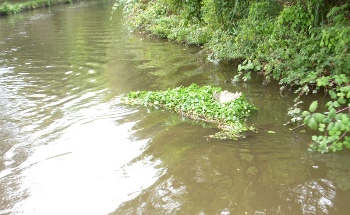ANOTHER waterway that has succumb to the aggressive Floating Pennywort is to have it removed.
There is to be a two year programme on the Wyrley & Essington Canal that will focus on tackling the invasive plant, with a grant from SITA Trust of £100,000, with the plan to promote growth of the protected native plant species Floating Water Plantain.
 The grant has been given in the anticipation that the clearing of the Floating Pennywort will also benefit species such as water voles, great crested newts and the like.
The grant has been given in the anticipation that the clearing of the Floating Pennywort will also benefit species such as water voles, great crested newts and the like.
Rarest water plants
Floating Water Plantain is one of Europe's rarest water plants and there are currently thought to be fewer than 20 locations where populations of the plant can be found in England. It was initially limited to the waterways of north Wales but spread to England via the canal system in the late nineteenth century.
The grant funding will be used to carry out a number of physical works to limit the spread of invasive species including removal, cutting back overhanging vegetation which blocks light to the canal and limiting run-off from adjacent land using natural filters such as reed beds.
 Various Canals
Various Canals
The project site covers a 19 miles section of the Wyrley & Essington Canal (pictured) including the Cannock Extension Canal which is a Special Area of Conservation and the Anglesey Branch.
The project will be led by British Waterways supported by the Birmingham & Black Country Wildlife Trust, Walsall Metropolitan Borough Council, Wolverhampton City Council and the Environment Agency.
SITA Trust provides funding through the Landfill Communities Fund. Funding is available for community and environmental groups to carry out a range of improvement projects.
